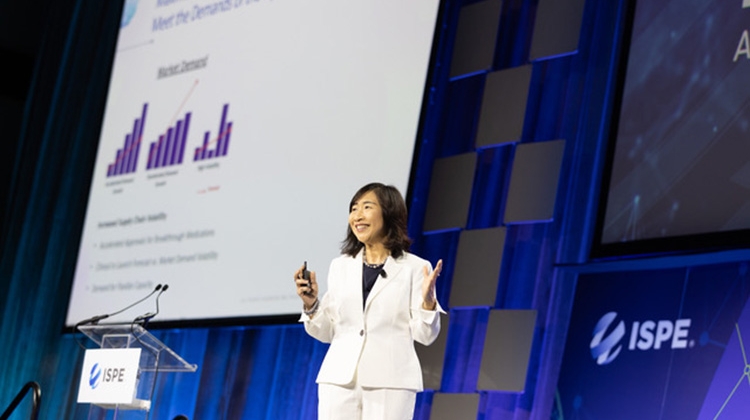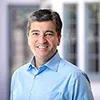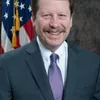Monday morning kicked off with the 14th Annual ISPE 5K Run/Walk, followed by a captivating session of opening remarks from the Conference Chair Joydeep Ganguly, Senior Vice President – Corporate Operations and Chief Sustainability Officer, Gilead Sciences, Inc. and Thomas Hartman, President and CEO, ISPE, who warmly welcomed all the attendees. Ganguly expressed that it had been a distinct honor to serve as chair and that the speakers at the conference represented the best of the industry.
Speakers at the opening session discussed the power of resilient supply chains, the success of a new research center, and the pursuit of excellence in novel therapeutic development. The morning session ended with a fireside chat with Robert M. Califf, MD, Commissioner of Food and Drugs (FDA).
Executive VP of Global Operations & IT, Chief Sustainability Officer
AstraZeneca
Navigating Uncertainty: The Power of Resilient Supply Chains
Cheng pointed out that VUCA (volatility, uncertainty, complexity, and ambiguity) was a way of life that companies would have to continue to deal with as supply chains face unprecedented challenges and uncertainties. However, she said, amidst the chaos, there lies an opportunity to build resilience and emerge stronger.
“COVID-19 really highlighted how our world can change overnight and since then, the word dynamic has taken on a very different meaning. Between now and 2030 AstraZeneca’s mission is to launch at least 15 new molecular entities (NMEs) and transform patient outcomes. Our world continues to change rapidly due to supply chain uncertainties, geopolitical tensions, and climate crisis. What can we do to navigate these uncertainties? How do we collectively as an industry overcome these challenges? We must evolve and adapt for the future, simplify what we do, leverage data and AI to accelerate digitalization, and upskill a diverse and inclusive workforce.”
Cheng said, “Climate conscious decisions are critical to future supply chain resilience,” and told the audience of AstraZeneca’s Ambition Zero Carbon initiative. She added, “It cannot be solved by one company, we need to set up partnerships. We all have a role to play as we strengthen our supply chains to make sure they are strong enough to withstand challenges and do our part to ensure we have a healthy planet for generations to come.”
Executive Vice President of Research
Gilead Sciences
Science, Patient & the Role Engineering Plays as a Catalyst
Scientific innovation is moving faster than ever before. In this environment, top scientific leaders and pharma organizations are driven by the needs of researchers working across a myriad of scientific platforms, therapeutic areas, and methods. Moving beyond the historical imperatives of delivering cost-efficient assets on time, engineering and operations teams must partner with CSOs and other scientific leaders to add exponential value to research settings.
Ganguly interviewed Martin about how we became involved with the pharmaceutical industry. Martin said he, “wanted to do something meaningful, I wanted to do something that would truly change the world.” Martin went on to discuss Gilead’s plans for a new research center in Foster City, which is recognized as one of the most sustainable biotech campuses in the world, as evidenced by its use of renewable energy, large-scale solar installations, and eco-friendly infrastructure. He said it was key to listen to researchers and scientists about what they need.
President and CEO
AltruBio, Inc.
The Pursuit of Excellence in Novel Therapeutic Development
In an era where the need for groundbreaking treatments to address unmet medical needs has never been more pressing, it is crucial for us in the pharmaceutical engineering community to develop and enable technologies in a timely manner. Chou addressed the successful introduction of novel therapies, especially advanced therapeutic medical products (ATMPs), as a testament to the fruitful partnership between engineers and biological scientists. To accelerate the development of novel therapeutics further, significant opportunities for enhancement remain, particularly in the realms of operational excellence in manufacturing and addressing sustainability challenges related to supply chains and energy consumption. Embracing ongoing disruptive technologies is imperative and inevitable in achieving these goals.
Chou said that biologics including advanced therapies continue to dominate as a modality requiring a need for improved biopharmaceutical manufacturing and that companies should strive for maximized flexibility with minimal footprint to meet the demands of the dynamic market.
Commissioner of Food and Drugs
FDA
Past President and CEO of ISPE
ISPE
Fireside Chat with Robert Califf, MD, Commissioner of Food and Drugs (FDA) and Thomas Hartman, President and CEO, ISPE
Hartman and Califf discussed the FDA’s programs to support innovation and how the FDA supports collaboration to make pharmaceutical manufacturing more resilient. Califf said that there needed to be interaction among global regulators to harmonize guidances and added that the US was focused on trying to be leaders in innovation and work to develop collaboration around the world.










